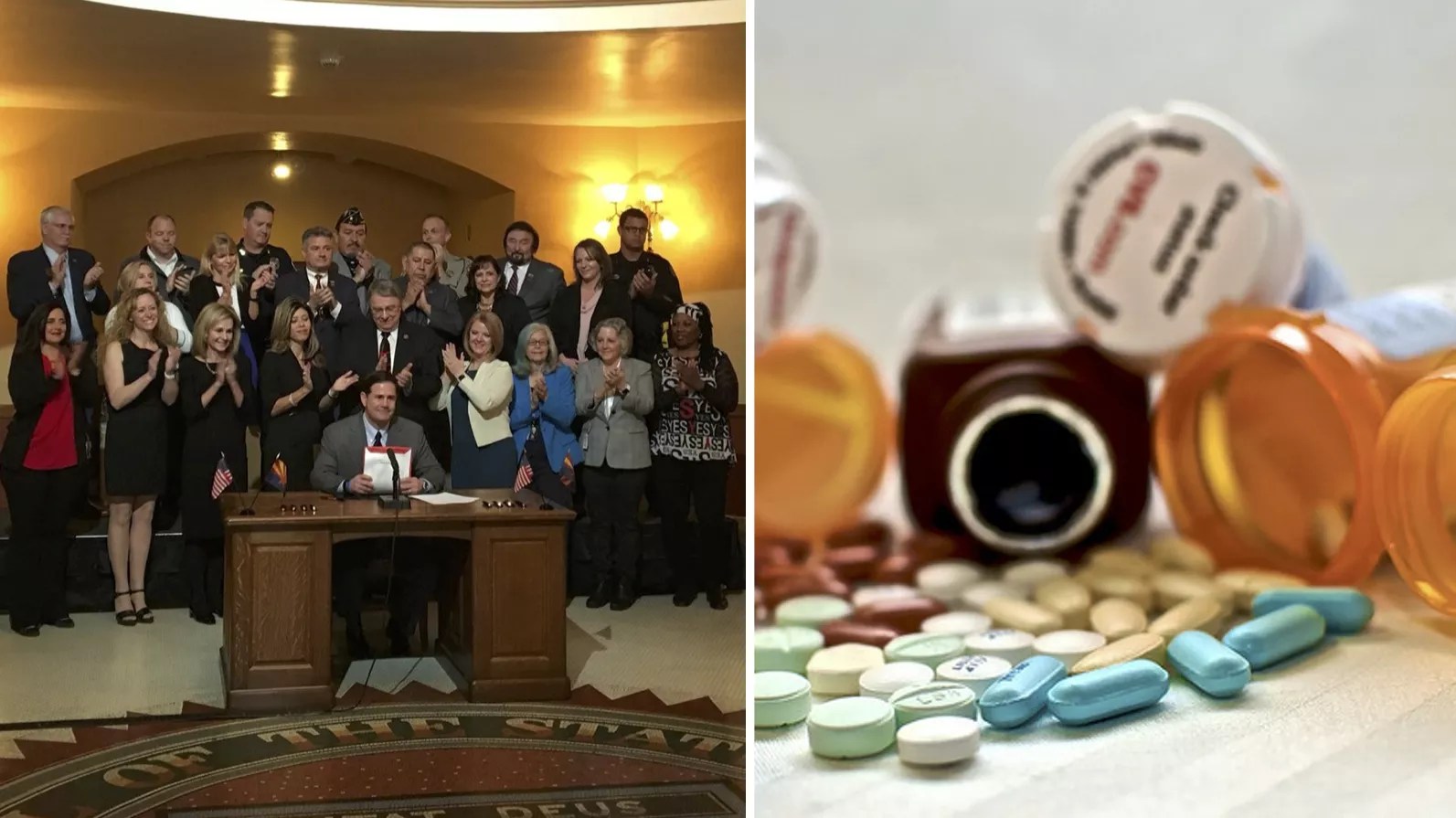
Doug Ducey/Twitter; Almond Butterscotch/Flickr

Audio By Carbonatix
Governor Doug Ducey signed into law an omnibus bill dedicated to curbing the opioid crisis this morning, the day after the plan passed in the legislature. In a pretty remarkable show of bipartisanship, the measure received unanimous support in the House and Senate.
The act went through the legislature at breakneck speed during a special legislative session after Ducey rolled out the package earlier this week.
Ducey signing the bill marks another step in his public fight against the opioid crisis. There’ve been more than 800 opioid-related deaths in Arizona since last June, when Ducey declared it a statewide health emergency. In the signing ceremony, Ducey dedicated the law to the individuals who have died as a result of the crisis.
So what does the Arizona Opioid Epidemic Act actually do? The law addresses the two fronts of the war on the opioid epidemic: prescription and treatment.
1. Limiting Opioid Prescriptions
Let’s start with one of the more significant (and contentious) parts of the bill. The omnibus package sets a limit on how many days of opioid medication doctors can prescribe to patients on an initial visit.
The governor’s office cited Centers for Disease Control and Prevention research that showed three days’ worth of medication is often sufficient to manage pain; at the same time, several successive days of opioid use increases the probability that a first-time patient will continue to use the drugs long-term.
Because of the new law, Arizona doctors cannot prescribe more than five days’ worth of drugs. Only under a few limited scenarios can they prescribe more, including if someone is suffering from chronic pain, a traumatic injury, or is in recovery from surgery. This raises the question: If someone needs a more substantial prescription to manage pain, will they be able to get access?
Ducey sought to dispel these concerns during his TV victory lap on Friday morning.
“For people that are in chronic pain right now and are benefitting from these miracle drugs, there’s no change for them right now. No change at all,” Ducey said on FOX10 this morning.
But people are worried, the anchors chimed in.
“And I’ve heard that as well,” the governor said. “I’m out in the marketplace, and people are concerned or scared, or they’re a burn victim or a cancer survivor. There’s no change for them. This is people that are not yet addicted; we want to keep them from becoming addicted.”
Another provision places a cap on the dosage amount doctors can prescribe. Using a measurement of morphine medical equivalents (MME), under this bill doctors can only prescribe more than 90 MME drugs in special circumstances – ordinarily, they have to keep the dosage to less than 90. The governor’s office says the average prescription strength in our state is 62 MME.
Like the five-day cap, the dosage limit also provides exemptions for patients suffering from serious conditions. When prescribing outside of these special cases, doctors who want to prescribe more than the 90 MME limit need to consult a board-certified pain specialist.
WATCH: Gov @DougDucey’s remarks before signing the #ArizonaOpioidEpidemicAct.
“This bill is for them.” pic.twitter.com/8u8ckLsDqA
— The 9th Floor (@9thFloorAZ) January 26, 2018
2. Fraud
The act also cracks down on pill manufacturers who defraud others, allowing them to be held criminally liable and subject to prison, as opposed to civil liability. Additionally, easily forged paper prescriptions for highly addictive drugs like Oxycontin and morphine will have to be prescribed electronically instead.
And doctors who overprescribe under the new rules could be disciplined or have their licenses yanked, thanks to new access for medical boards to prescription data from the Controlled Substance Prescription Monitoring Program.
As it happens, Arizona recently made headlines in the area of drug fraud for the FBI’s October 26 arrest of John Kapoor, mega-wealthy founder of Insys Therapeutics. Insys is a major pain medication manufacturer, but federal law enforcement has charged 74-year-old Kapoor and other executives with a bribery scheme to fraudulently push their drugs. Arizona’s attorney general Mark Brnovich sued Insys last fall.
In light of Kapoor’s history and Ducey’s new law, file this one to bad optics: The Insys founder also donated $5,100 to Ducey’s re-election campaign. But Ducey’s campaign manager told the Arizona Republic that Ducey donated Kapoor’s cash to the Salvation Army.
3. Naloxone
Auxiliary health officials will be able to carry and administer naloxone, an overdose-reversal drug that can save lives if a victim is unable to get to a hospital right away. These officials who are now authorized to administer the drug include police aides, county health departments, and probation officers.
This comes after Ducey’s declaration in June of a statewide opioid epidemic trained first responders with naloxone and provided over 5,000 naloxone kits to law enforcement.
4. Treatment
The law allocates $10 million for treatment for people struggling with opioid addiction who don’t have health insurance. But when you consider the scope of the crisis – the Department of Health Services reported over 3,000 overdoses in Maricopa County alone since June – $10 million may be a drop in the bucket. There are also new provisions for allowing people who are receiving medication-assisted treatment to stay in behavioral health facilities and recovery homes.
5. ‘Good Samaritan’ Rule
Someone who calls 911 to alert first responders of a possible overdose will not face drug charges, in what’s known as a Good Samaritan measure. However, law enforcement can still charge people on the scene with any non-drug related crimes and can collect drugs and paraphernalia.
Ducey hopes the measure will dispel fears about calling 911 to get help for someone in an overdose crisis. Nevertheless, the Samaritan provision of the new law expires in five years.